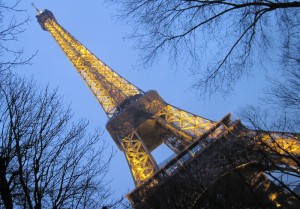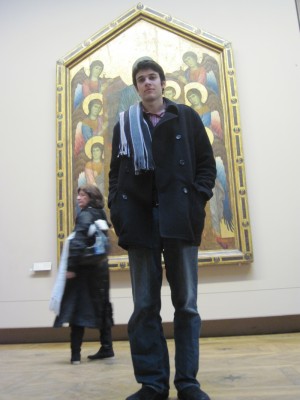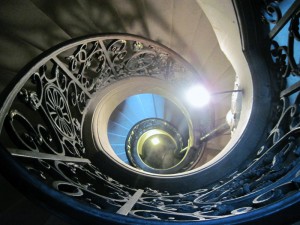
Paris. It’s a city of history, culture, politics, business, art, fashion, and much, much more. Its very name connotes a broad range of emotions and ideas, chief among them romance and beauty. And while it is true that there is much to discover and enjoy, the fact that the city is so celebrated can be completely overwhelming. There is, for example, no humanly possible way to see all of the artwork at the Louvre (it would take 43 full days if you looked at each item for just 10 seconds), much less see everything at the hundreds of other celebrated museums, palaces, and functional art that graces the streets of nearly every quartier, or neighborhood. And that’s just art.
For those very same reasons, Paris is one of the world’s most written about cities. There is probably not a single neighborhood, street, shop – hell, rat colony – that hasn’t been thoroughly dissected, written about, photographed, and then either put online or included in one of the hundreds of guidebooks to the city. This makes it hard for someone studying abroad in Paris to write anything unique or of lasting value to most readers, especially on a recurring basis, like for this column, which I will be trying to update once every week or two.
Granted, as a BU student studying at the BU Paris program, I could choose to focus on BU’s program here, which would be of value to readers thinking about attending the same program over the summer or next semester. However, I think such a limited focus would quite defy the point of going to Paris in the first place: to expand ones horizons by exploring a completely new place, culture, and language.
What useful things I can tell you about the BU Paris program will fit nicely in this paragraph. Although it’s been only two weeks so far, I highly recommend the program. BU’s building is in a good location. The staff is professional and all very nice. They are there to help you. The teachers are good for the most part (and all native French speakers), and the classes aren’t too easy, but aren’t too hard. The first few weeks of the program are set up to ease you into living in Paris without making you too dependent on BU. It’s a fine line to tread, but they do a pretty good job of it all things considered.

Now that that’s over with, I think the best way to approach the rest of this column will be to talk about the challenges of being an American in Paris (Gershwin shout-out) and trying to assimilate into French culture. Sometimes the column will be bleak with stories of frustration; other times it will be bright with celebrations of all there is to see and enjoy in Paris – and there is so much. Hopefully, it will resonate with the vast majority of readers, whether they are interested in French culture, want to study abroad (anywhere), want to vacation in France, or are just interested in reading about the human condition and how we adapt.
To begin, let me give you a contradiction, something the French love: humans are great at adapting, but have a hard time doing it. What I mean by this statement is that although I was functioning normally in Paris the very first day I got there – I successfully found my home stay, bought a sandwich without using English, had a galette de roi and four glasses of wine with my host and her brother and sister-in-law, talked about myself in French, and slept through most of the night – I still, two weeks later, feel strangely disconnected from the very ground I walk on every day. If I were a tourist, this would be perfectly normal, and would last the duration of my stay. However, my goal here is not simply to see the sights but to become a citizen of Paris: not just the giant tourist trap, but the real living, breathing city where people live and die and get up and go to work every day.
Most of this disconnect can be attributed to the language. I have studied French every semester without a break for the last seven years, but I am nowhere near fluent, nor will I be by the time I leave. The main problem is not vocabulary; it’s simply the constant effort required to understand spoken French. Unlike English, my brain does not yet automatically process anything but some of the more basic and commonly used phrases. This means that I have to consciously translate phrases to operate in French, which can add a lot of extra work and be extremely tiring.

At the same time, the total immersion that comes with living in the largest French-speaking city on Earth for just two weeks has already vastly improved my abilities. There are times now when I think to myself in French, dream in French, and some phrases now come out automatically in French. You’ll probably have observed some Francoismes in this column, which is evidence of something else: my English has become much, much worse in a very short time. This development is the most disconnecting of them all. I now find myself trapped: unable to fully understand the culture around me while I become more and more disconnected from my own.
During the first few days of orientation, the staff at BU Paris warned us that everyone goes through this phenomenon. At some point, they told us, usually in the fourth or fifth week, the total immersion will turn into total overstimulation. The foreign language and culture around us will build, becoming a crescendo of sounds and acts increasingly familiar but somehow just out of reach until, at some point, we crack, and each are forced to accept the fact that we will not be able to fully assimilate, but will operate as an other for the next three months.
Right now, I can feel only the very first currents of the wave I know will hit soon, but I haven’t had time to stop and appreciate it because I’ve been too busy enjoying the art, the food, the wine, and the city. My hope is that when the wave does hit, I will be able to see it too as another unique experience that only being abroad can offer.

6 Comments on “BU in Paris: The Art of French Sensory Overload”